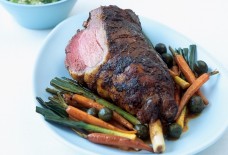Man’oushe, Lebanese flatbread, rises in Oakland
By Jessica Battilana
San Francisco Chronicle
Not Reem Assil, who in 2009 called it quits on a career as a community and labor organizer and enrolled in the baking and pastry course at Laney College in Oakland, and in doing so changed the course of her life.
Assil, who was born to a Palestinian mother and a Syrian father, was raised in the Boston suburb of Watertown, Mass., her family part of a small but tightly knit Arab community. She describes her mother, who did most of the family’s cooking, as a “practical cook,” but the flavors of Syria, Palestine and Lebanon, where her mother lived as a young woman, were woven into the family’s meals.
Assil followed her education at Laney with practical, hands-on experience at the Emeryville outpost of the cooperatively owned Arizmendi Bakery, where she began experimenting with incorporating Middle Eastern flavors into the baked goods. In 2010, she took a trip to Syria and Beirut and it was there — in a corner bakery where, she says, “the fresh flatbreads were flying through the air” — that her vision of her future crystallized.
She would not return to labor organizing. Instead, she would bring the Arab corner bakery experience to the Bay Area. “Fresh bread is the lifeline of Arab history,” Assil says. “I want to celebrate that here.”
Photo: Russell Yip / The Chronicle
Now, she’s incubating her business, Reem’s (reemscalifornia.com), at La Cocina, using the commercial kitchen space to make Arab breads and spreads for catering clients; she hopes to open her own bakery soon. In the meantime, she also teaches baking classes at the Arab Cultural Center.
Assil, who has dark, curly hair and the muscled forearms that come from kneading lots of dough, specializes in man’oushe (pronounced man-OO-sha), a Lebanese flatbread that’s often eaten as a breakfast or late-night snack.
In Lebanon, the basic version is topped with just a smear of za’atar, a spice mixture made from sesame seeds, wild thyme, dried sumac and salt blended with olive oil; cheese versions exist, as well as man’oushe topped with a cured beef sausage called sujuk. Often the flatbread is loaded with toppings, then rolled into a handheld sandwich.
“Like pizza, you can find them topped with everything under the sun,” says Assil, “and everyone has an opinion about what makes the best man’oushe.”
Untopped, they puff in the oven like pita bread, easy to stuff and serve. Any way you top or fill them, they’re irresistible, the dough chewy and supple, easy to roll and quick to bake, hopefully flying through the air near you soon.


